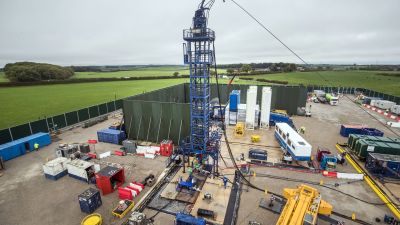Review on scientific evidence around fracking commissioned as government 'considers all options'

A review has been commissioned into the latest scientific evidence surrounding fracking as the government considers "all possible domestic energy sources" in light of the invasion of Ukraine.
Shale gas extraction has been paused since November 2019, following concerns about the accuracy of predicting tremors associated with fracking.
But Business Secretary Kwasi Kwarteng has now written to the British Geological Survey asking for a report on the latest science around fracking.
It will look at new techniques, improvements in geological modelling or areas outside of Lancashire - where fracking has taken place - less at risk of tremors.
It comes as the fossil fuel industry and some MPs have urged a restart to fracking or more extraction from North Sea oil and gas to secure energy supplies and ease prices.
The UK regulator also agreed a reprieve on an order to seal up two wells at a site in Preston New Road, after company Cuadrilla was told it had to carry out the action by the end of June 2022.
The North Sea Transition Authority(NSTA) has now extended the deadline to at least June 2023.
Caudrilla says it is convinced the Bowland shale gas resource, at its site near Preston, "has the potential to be a very significant contributor to UK energy supply and a source of cost-effective fuel for heating homes and businesses."
But there have also been widespread calls for insulating homes, more renewables and weaning the country off gas in response to the crisis, and warnings further domestic fossil fuel exploration will do nothing to lower prices pegged to international markets.
Mr Kwarteng said: "It remains the case that fracking in England would take years of exploration and development before commercial quantities of gas could be produced for the market, and would certainly have no effect on prices in the near term.
"However, there will continue to be an ongoing demand for oil and gas over the coming decades as we transition to cheap renewable energy and new nuclear power.
"In light of Putin's criminal invasion of Ukraine, it is absolutely right that we explore all possible domestic energy sources.
"However, unless the latest scientific evidence demonstrates that shale gas extraction is safe, sustainable and of minimal disturbance to those living and working nearby, the pause in England will remain in place," he said.
The request has been made to assess if any progress has been made in the scientific understanding which underpins government policy.
It will also allow ministers to consider next steps, and a report is expected before the end of June 2022.
What is fracking?
Fracking, or hydraulic fracturing, is a process in which liquid is pumped deep underground at high pressure to fracture shale rock and release gas or oil trapped within it.
The process has been mired in controversy since it hit the headlines in 2011 for causing two minor earthquakes in Lancashire, prompting a temporary ban on fracking in the UK.
That was later lifted, with controls put in place to prevent tremors, but fracking continued to draw opponents who fear it can also cause water contamination, noise and traffic pollution.
Environmentalists also warn that pursuing new sources of gas - a fossil fuel - is not compatible with efforts to tackle climate change, and the focus should be on developing cleaner sources of energy such as renewables.
Fracking at Preston New Road in Little Plumpton was suspended indefinitely after a record-breaking tremor measuring 2.9 on the Richter scale in August 2019, with the moratorium or "pause" coming in a few months later.
The controversial process of extracting shale gas saw huge protests at the site for several years.
Earlier this year, Cuadrilla, who operated the site was ordered to permanently cap and abandon the only two horizontal shale wells that have been drilled in the UK.
That demand was suspended as Russia's invasion of Ukraine intensified already soaring gas prices, which have hit households with a more than 50% increase in energy bills.
At the end of March the UK regulator agreed a reprieve on an order to seal up the two exploratory wells at Little Plumpton.
Cuadrilla, the firm behind plans to frack shale gas, had been ordered to plugs two wells at Preston New Road by the end of June 2022.
But the North Sea Transition Authority(NSTA) has now extended the deadline to at least June 2023.
The move comes as the Government prepares to unveil its new energy security strategy, in which it is expected to set out plans to boost new nuclear power capacity, solar and offshore wind, but not cheap onshore wind, which is popular with the public but opposed by some Tory politicians.
Ahead of the strategy's launch, minister Jacob Rees-Mogg downplayed the earthquake risks from fracking and suggested "every last drop" of oil should be extracted from the North Sea.
But UN science body the Intergovernmental Panel on Climate Change (IPCC) issued a report on Monday warning of the need for immediate and rapid emissions cuts, with substantial reductions in fossil fuel use, to avert catastrophic climate change.
As the report was launched, UN Secretary General Antonio Guterres said investing in new fossil fuel infrastructure was "moral and economic madness".
More information on the Government report can be found here.